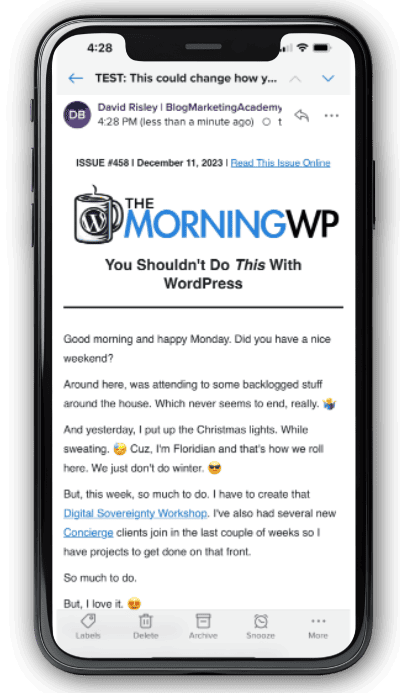It has been said before in other circles:
You can’t control what you don’t measure.
This statement is true. It means that if you don’t track something and keep tabs on it, you are not in control of it.
Many people tend to think a statement like this is primarily relevant to executives and people who run a company. However, that is limited thinking. The truth is that this statement is relevant to everybody. To you.
And I’ll take it a step further…
What you measure predicts your future. If you track the wrong things, things go out of whack.
Imagine if, while running a business, you actually kept track of how many paperclips you used. Wouldn’t make very much sense, would it? Why is that? It is because paperclips are not a measure of what’s important for the business. Paperclips have no bearing on income.
Many bloggers actually view their number of RSS subscribers as an important number. They track it closely and get freaked out over Feedburner’s various hiccups. Why? Your RSS subscriber count is not an important number. Because, if you intend to make money with your blogging, you should realize that RSS subscribers have a very low level of engagement with your site and it is very low priority. If you track RSS subscribers and, therefore, put your efforts into raising that number, you could end up with a nice subscriber base and still be broke.
The proper approach is to figure out what is most important to you – your #1 product. Then, you work out the things to track which are directly relevant to that product.
If you want to generate revenue from your blog, you should be tracking things like:
- Income (surprise!)
- Number of email list subscribers (because an email list is directly monetizable while RSS is not)
- # of points of contact with others in your niche, etc.
- Real promotional actions (things that directly relate to income)
Things that don’t have a direct impact on income would be:
- RSS subscribers
- Tweets
- Blog comments
- Wall posts on Facebook
- Number of Twitter followers or Facebook friends.
Realize that some of these things can be seen as indicators of how much reach you’re building, but in and of themselves, they have little to no bearing on your #1 goal – revenue.
Most bloggers don’t track anything at all and that’s a huge mistake (unless they’re just hobbyist bloggers). If they do track anything, they might loosely monitor things like number of Twitter followers, number of RSS subscribers, how often they post to their blog, etc. And – SURPRISE! – you’re not making much money if that’s the case.
… Because you’re measuring the wrong things.
Oh, and once you identify the right things to keep track of, actually TRACK it. Like, really track it and graph it so you can spot the trends.
In my business, Lisa (my VA) tracks my income from various sources as well as changes in email list size. Because those things matter. We track it in a spreadsheet. I don’t waste my time tracking my followers on Twitter or how many “fans” I have on Facebook. They’re not important in the grand plan. If I monitor the right things and grow those, things like Twitter and Facebook will raise as an automatic result.
What I’m talking about here is one of many habits that separate the professional blogger from the hobby blogger.
I recommend that you take a little time and identify the most important things for you to keep track of, then begin tracking it. On a weekly basis, plug the numbers into a spreadsheet (Google Docs is nice), and get some trend graphs in place. Then, you can begin gauging your actions based on getting those trends to increase in your favor.
What you measure predicts your future. Start measuring the things that really matter.
Got A Question? Need Some Assistance?
Have a question about this article? Need some help with this topic (or anything else)? Send it in and I’ll get back to you personally. If you’re OK with it, I might even use it as the basis of future content so I can make this site most useful.



